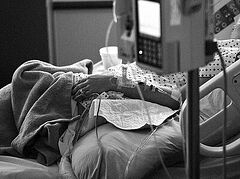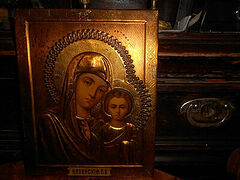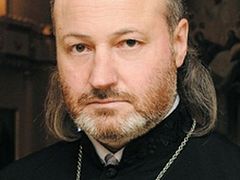 Fr. Oleg Stenyaev baptizing in Chechnya. The godfather is holding the water.
Fr. Oleg Stenyaev baptizing in Chechnya. The godfather is holding the water.
During the Second Chechen War—1998-2000—with the blessing of the Church authorities, we conducted charity and missionary programs on the territory of the Chechen Republic. We gathered children’s items, toys, office supplies, condensed milk, and all sorts of groceries and candy in the churches in Moscow. We drove through Rostov to Nalchik, and then, passing through the Caucasus checkpoint, we entered the territory of Chechnya. The items were mostly distributed in Grozny, on Minutka Square, which later became world-famous.
At that time, of course, there were very strong anti-Russian sentiments. Grozny was wiped off the map, like Stalingrad, and it was hard to know how to communicate with these people. But when we started handing out the material assistance, and they saw that we were Christians and treated them with benevolence and compassion, it changed the situation a little, and we were able to talk with them a little bit.
Nevertheless, it was clear that they wouldn’t listen to a missionary sermon, as they say, “head-on,” so we had to find some way, so it wouldn’t seem intrusive.
One day we stopped at a café for a snack. War after war, and markets, cafés, and stores were working hard—the shooting would in one area, and all the commerce would immediately move to the next street. We went in. The locals looked at us askance, and in this place you couldn’t immediately figure out who you were looking at—a militant or not? One guy leaves his machine gun around the corner and seems to be a peaceful civilian, but then he steps away from you a few feet—and it’s a militant!
But there were ordinary people sitting around, eating peacefully, and I thought: What would I talk to them about? Maybe ask about their names? It should be noted that Eastern people, as a rule, take their names very seriously. There, a name isn’t just given, but it’s necessarily associated with some ancestor or someone respected by the people; and in general, a person always knows exactly why he has this name. Therefore, probably none of them were indifferent about their names, and I asked the man sitting next to me:
“Excuse me, what’s your name?”
He tensed up a little, but answered: “Musa.”
“Would you like me to tell you something about your name?”
So I started talking about the God-seer Moses, about how the Lord appeared to him, about how he led the people out of Egypt.
They were all very interested and huddled around our table, and when I finished about Moses, one of them said:
“And what could you say about my name? My name is Jabrail.”
“Well,” I answered, “Jabrail—he wasn’t even a human!”
His friend turned to him with a laugh:
“Haven’t I been telling you for a long time that you’re a jackass?!”
“No, no,” I explained, “we call this name Gabriel, and it’s the name of an archangel of the Lord—a special messenger of God!”
So I started telling them about the Archangel Gabriel. After a while, the owner of the café himself appeared—a real son of the mountains, somewhat rough looking, with a traditional Chechen cap—and said:
“Explain my name to me! My name is Isa!”
And then I could safely tell them about Christ…
***
We went back in the evening. We drove through the Shemashkinsky Forest. It was sleeting, fog, and we were stopped on the highway to be checked by militants. They were serious people—in camouflage, with beards, machine gun magazines—and if you didn’t stop, they’d shoot immediately. They were approaching us, and we also had beards, and they probably thought that despite the Moscow license plate numbers, we were their brothers coming to help them. They even shouted something to us from a way’s off in Chechen, and I said:
“Moscow Patriarchate. We brought humanitarian aid.”
They frowned, but suddenly one of them, who I later recognized as one of the guys from the café, said:
“I know them, they’re good people. I myself saw them distributing everything free on the square. They’re not profiteers.”
Then I remembered the text from the Bible where it says that the bread cast upon the waters always returns (Eccl. 11:1). In other words, a good deed done selflessly always returns to you…
“Any weapons?” the head asked. “If there’re no weapons and you’re not profiteers, then go head, and may Allah bless you.”
I told the driver: “Come on, let’s get going!”
But his car wouldn’t start. We were all nerves. I looked, and there were other people now. It looked like some angry guys were coming. What would happen to us? They’d put us in an underground prison, lower a phone to us on a string, and say, “Call and negotiate a ransom!”
The head approached us again: “Why aren’t you leaving?”
“The car won’t start no matter what.”
“I’ll call a mechanic.”
And then, believe it or not, there was a burly black man in camouflage. He leaned his machine gun against our wheel and started digging around in the motor with the driver.
Then the new guys came over, the angry ones. They were disheveled, squinting in our direction. That’s it, I thought, they’re definitely going to throw us into a pit. We’re lost, we can’t avoid the pit. I decided I should drink some alcohol, to at least not immediately freeze in the pit. I was given alcohol for the road for such cases, because I have constant health problems—frequent colds, coughing. I poured a glass, crossed myself, and drank it. I immediately felt warm, better, and I somehow felt emboldened. And I thought: “Why are they constantly stealing our priests?! Three people are missing already! I’ll go find out.”
I got out of the car, went up to them and said:
“Tell me, why are our priests being kidnapped here? In Moscow, the mosques are open, no one touches anyone, we bring humanitarian aid here, we give your children condensed milk for free, but here we’ve already lost three people!”
They said:
“No one will touch you. Go get in your car. Go quietly. You’ll be fine.”
I said:
“Well, okay, so they won’t touch me, but why were the others kidnapped?!”
One of them explained:
“They weren’t priests, they were ‘parachutists.’”
By the word “parachutists” they meant infiltrators, spies. I said:
“Why do you think they were ‘parachutists?’ What’s your definition of that?”
“Because they were all so fit, buff, athletic—they were spies. You’re definitely a priest.”
“Why do you think I’m definitely a priest?”
“Well, look at you: fat, audacious, a little drunk—it’s immediately apparent that you’re a priest! No one will touch you here. Everyone fears Allah! Our Koran says that we mustn’t hurt either monks or priests. Go quietly!”
They pushed our car and we drove off. The same day, we were shelled by our own. We were driving and we saw a military unity, and we decided to stay with them. My driver and I were both bearded; I was all disheveled, and we were both in black. They decided we were suicide bombers rushing straight for the unit, and how they gave it to us! But, thank God, it all flew by us. I jumped out of the car, waving my arms:
“Don’t shoot! We’re on your side! Moscow Patriarchate!”




